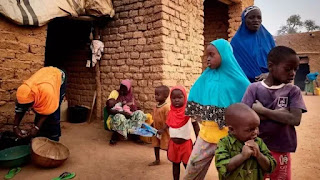Mali's ruling military has succeeded in attracting citizens and inciting nationalism.
They have succeeded in getting the leaders of the Economic Community of West African States (Ecowas) to lift sanctions imposed on the country as a result of their coup, according to Paul Melly.
After setting February 2024 as the date for elections, Mali's military government has succeeded in persuading Ecowas to lift its sanctions.
For ordinary Malians, especially those living in the capital Bamako, many of whom depend on imported food, this is good news for them.
Although the measure does not mean stopping the importation of consumer goods, it is actually an additional burden for entrepreneurs and families, who are suffering from the rising food and fuel prices that the world is currently experiencing, as a result of their demand. which increased worldwide due to the cholera epidemic and the Ukraine war.
Sanctions were imposed in January after the military junta announced a four-year delay in returning the country to civilian rule.
They have now reduced the deadline to less than two years, with elections to be held in February 2024.
Ecowas leaders approved the move during their summit in the Ghanaian capital, Accra, over the weekend.
Bullying of neighbors
This is a major victory not only for Mali's military government but also for Ecowas, which many Malians and others view as a bunch of sympathetic leaders, who see the coup as a threat. chickens, and they turn away from their sins.
Mali's military rulers and Prime Minister Choguel Maïga have taken to the streets in a show of respect for Ecowas leaders, showing the nation that they are patriotic and protect their people. her from her abusive neighbors.
Neighbors who do not welcome any attempt to bring about radical change in a country where corrupt leaders are prone to corruption may find it difficult.
Over the past six months, any harsh message from Ecowas or Europe or the United Nations has met with strong opposition from the Malian people.
In mid-May, the military government announced it would withdraw from the G5 Sahel group, formed in 2014, to fight jihadists.
The military government has continued its dealings with Russian security firm Wagner, despite allegations that the company has been accused of human rights abuses by its mercenaries.
Relations between France and the rest of Europe have soured, with France announcing the withdrawal of its troops to fight jihadists, a withdrawal that will be completed next month.
Meanwhile, the Malian army has tightened its rules on UN peacekeepers, known as Minusma.
They prevented investigators from abusing civilians and others, such as those of Russian mercenaries and the army, who killed nearly 300 people in the village of Moura in late March.
Despite the Malian military's resistance, they are slowly making progress in their political agenda, which Ecowas can accept.
Number of coups
At first, West African leaders wanted to relax.
Their correspondent on the Mali crisis, and former Nigerian President Goodluck Jonathan, has been touring Mali.
However, Ecowas later said it needed to put a brake on the region's growing number of coups, which it would have previously asserted that most of its countries were under multi-party civilian rule.
A second coup took place in May last year, after the first in August 2020.
In September, Colonel Mamady Doumbouya overthrew President Alpha Condé.
Colonel Mamady Doumbouya (center) is a former French soldier
Burkina Faso, meanwhile, was suddenly overthrown by the military in January when President Roch Marc Christian Kaboré, who was elected for a second term in office 14 months ago, was accused of failing to crack down on pro-government protesters. crusade.
What then saw what was seen as a failed coup attempt in Guinea-Bissau.
Eleven people were killed as troops loyal to President Umaro Sissoco Umbaló stormed a rally on Friday, removing hundreds of protesters by truck.
There are also rumors that other countries in the West African region could join the military coup.
Ecowas must therefore take steps to curb this atrocity by overthrowing civilian governments.
The group must also find a way to return those countries to civilian rule, including Mali, Guinea and Burkina Faso.
This is not only for the benefit of civilian rule in the West African region, but also because Mali is at the center of the Sahel conflict and efforts to quell militant groups and ethnic clashes in the region.
Continuing to isolate the country will only aggravate these conflicts and pressure from regional governments on food insecurity and climate change.
Stop the show
The Malian military government is slowly taking steps to reconcile and gain acceptance that proves to Ecowas that they are serious.
Among the measures are a new election law and the creation of an electoral commission and a statement or measures to restore the country to civilian rule, the most important of which is the issuance of a presidential election schedule for February 2024.
However, there is uncertainty as to whether the system will prevent incumbent President Assimi Goïta from running.
Whatever the case, the signs of a return to democracy have given Ecowas the impetus to continue talks with Mali's military leaders, over other details they need.
Many Malians have med the military's commitment to countering jihadist attacks
As a result, West African leaders have decided to lift sanctions on the country.
And they see this as a victory for them, which will lead to a return to the path of confrontation with Malian military leaders who claim to be patriotic, and neighbors.
This is seen as a much needed priority in a region that is experiencing a number of challenges.
Ecowas leaders also reached an agreement with Burkina Faso's military leaders to set a timetable for the country's return to civilian rule by July 2024.
Ecowas hopes that the victory between the two leaders will encourage Guinea's military to join the ranks.
The group chose former Benin President Thomas Boni Yayi as its mediator, for talks with Conakry's military authorities.











0 Comments